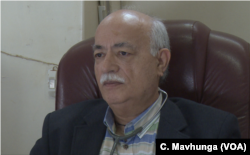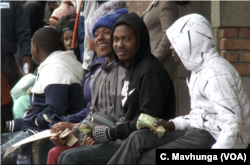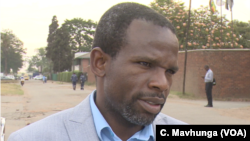In Zimbabwe, where an economic meltdown grows worse, businesses increasingly want payments to be made in U.S. dollars. The government has printed its own currency, called bond notes, for the past two years. But Zimbabweans are quickly losing confidence in the bond notes.
Dr. Ahmed Bilal Shah operates a medical center in one of Harare’s poorest suburbs. He needs money to keep going, but cash is hard to find.
“Let’s face realities of the ground,” he said. “I am accepting transfer or bond notes, but the thing is I have to make some solution from that to buy some U.S. dollars to buy some medicine to replace my stock. If I do not replace my stock, after one month I have to close my surgery. Pharmacies do not accept medical aid (insurance) or bond notes. But they are asking for the U.S. dollar. They have their own problems. So this is a question we are stuck up in.”
Zimbabwe abandoned its own dollar in 2009, after years of hyperinflation. Since then the country has been without an official currency and relied on U.S. dollars, the British pound and South African rand to conduct transactions.
In the past three years, however, all three currencies have been hard to find, paralyzing the economy and forcing the country to rely on bond notes.
Shah says if he cannot get U.S. dollars from his patients who have them, he has to turn to the black market.
But that presents problems, too. Over the past few days, police have arrested nearly 200 black market currency dealers, as the government tries to shut down their thriving but illegal business.
But on the black market, a dollar is now worth more than three bond notes.
Gift Mugano, an independent economist, says Zimbabwe’s economy will get worse unless the government of President Emmerson Mnangagwa takes action.
“The only thing to do in my view is to demonetize the bond notes,” he said. “I was one person who was against the bond note from the word go: I was very clear. This bond note will depreciate and will create havoc. The impact of the bond notes is beyond the size of how much bond notes we have. It is about perception. You take away confidence. We need to go back to full dollarization, where we have U.S. dollars, then attract investors because they gave certainty in your currency.”
Zimbabwe has struggled to attract investors for nearly 20 years, after a steep decline in the economy sparked by the policies of former president Robert Mugabe.
President Mnangagwa, who took office after Mugabe resigned under military pressure a year ago, has promised improvement. But so far, Zimbabwe remains struck in the crisis and is facing shortages of not only medicine, but nearly all essential goods.








